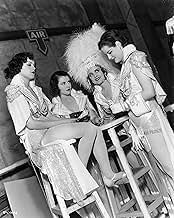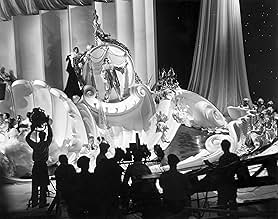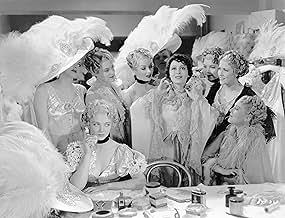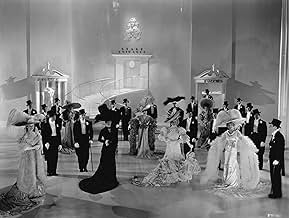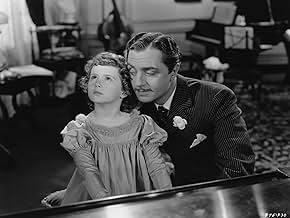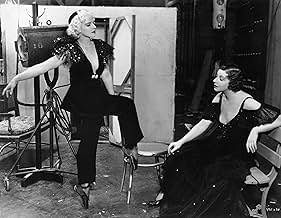Die Höhen und Tiefen von Florenz Ziegfeld jr., der berühmten Produzentin extravaganter Bühnenrevue, werden porträtiert.Die Höhen und Tiefen von Florenz Ziegfeld jr., der berühmten Produzentin extravaganter Bühnenrevue, werden porträtiert.Die Höhen und Tiefen von Florenz Ziegfeld jr., der berühmten Produzentin extravaganter Bühnenrevue, werden porträtiert.
- Regie
- Drehbuch
- Hauptbesetzung
- 3 Oscars gewonnen
- 8 Gewinne & 5 Nominierungen insgesamt
- Fannie Brice
- (as Fannie Brice)
- Dr. Ziegfeld
- (as Joseph Cawthorne)
Empfohlene Bewertungen
In fact, Ziegfeld cheated on both wives incessantly, and Ziegfeld never even formally married Anna Held to begin with - instead they had a common law marriage according to the statutes of New York. However, none of these other factors can account for the complete lack of chemistry between Powell (Ziegfeld) and Loy (as Billie Burke) in the film. Considering how the two had already been in several movies together by the time this film was made, and that they never failed to sparkle on screen together in the other movies, there must have been either a complete lack of direction or over-direction to wind up with the rather wooden performance that results whenever the two are in scenes together.
This movie would probably rate only about 6/10 if it wasn't for William Powell's performance. Marvelous as always, he was at least allowed to portray Ziegfeld as the cagey trickster and gambler with tremendous class that he was, and he absolutely makes the film. I can't think of any other actor of that time period who could have done as good a job.
Powell is, as always, terrific. Oddly he did not receive an Oscar nomination for this film but did get one the same year for MY MAN GODFREY. Luise Rainer won the best actress Oscar for her performance as Anna Held. Myrna Loy plays Billie Burke. The great Fanny Brice appears as herself and just about steals the show until they stupidly and abruptly cut away from her as she starts singing "My Man." She doesn't show up again.
Ray Bolger gets a whole number to himself. And Dennis Morgan fronts the mammoth "A Pretty Girl Is Like a Melody" number (although it's the voice of Allan Jones), which ranks among the great production numbers of the era. The camera slowly pans up a seemingly endless spiral staircase filled with pretty girls as draperies are raised to expose more and more staircase. Then we finally reach the top with Virginia Bruce posed there. It's a giddy and spectacular sequence.
The ballet sequence featuring Harriet Hoctor is rather a bore. I'd rather have seen more of Fanny Brice. Brice is hilarious in the dressing-room with blonde Esther Muir. Powell and Rainer are really excellent in this film. Notable co-stars include Frank Morgan, Joseph Cawthorn, Herman Bing, Marcelle Corday, Nat Pendleton, Grace Hayle, Ernest Cossart, William Demarest, and Reginald Owen.
And while Brice appears as herself the Will Rogers and Eddie Cantor appearances are fakes. Virginia Bruce plays a character based on Lillian Lorraine, and Rosina Lawrence plays Marilyn Miller (here named Sally Manners).
An excellent film in the old style and worth the 3 hours it takes to watch it. Ziegfeld was a great showman and he deserved this fabulous tribute. He died in 1932, having given the world a number of major stars and great shows.
Structurally, the narrative takes a chronological approach. However, except for the film's starting year of 1893 and the ending soon after the 1929 stock market crash, no dates are given, a shortsighted flaw in the screenplay. But during this roughly forty-year period we see Ziggy's ambition unfurl into a successful career of producing some of the most extravagant musical shows in history. And throughout, the theme remains the same: to "glorify the American girl", that is to say to glorify the early twentieth century stereotyped image of the American girl.
Despite his success as a showman, Ziggy was constantly plagued with financial problems, and embroiled in relations with women, the two most important being: the humorously indecisive Anna Held, and the lovely Billie Burke.
More interesting to me than the biography is the lavish, grandiose production numbers. In the most grandiose of all, Dennis Morgan sings "A Pretty Girl Is Like A Melody", as the camera ascends a slowly revolving spiral staircase adorned with "Ziegfeld girls" in outlandish costumes. The set, resembling a wedding cake, is about as tall as it is wide, with the stage curtain rising to what seems like stratospheric heights.
The film's strengths are its humorous script, the dazzling sets, the glamorous costumes, the music, a cameo appearance by Fanny Brice, and a great tap dance routine by Ray Bolger. My main complaint is the film's length. Also, I find it curious that this big budget beast with its theme of wealth and beauty came out right in the middle of the Great Depression. MGM must have been on a colossal ego trip.
Overall, "The Great Ziegfeld" is fun, and definitely worth watching, especially as a time capsule to an entertainment era that is gone forever.
Oscars Best Picture Winners, Ranked
Oscars Best Picture Winners, Ranked
Wusstest du schon
- WissenswertesA.A. Trimble, who portrays Will Rogers in the film, was a Cleveland map salesman who frequently impersonated Rogers at Rotarian lunches.
- PatzerIn the "Rhapsody in Blue" portion of the mammoth "Pretty Girl" number, one of the silver-fringe-and-antlers quartet of dancers gets visibly disoriented when her group does its final moves. She's the second one from the left, and her movements are completely out of sync with the other three until, with a thump, she sits down on the stairs. Since the incredibly complex number was shot in very long takes, the error was allowed to remain in the film.
- Zitate
Florenz Ziegfeld Jr.: [after catching Ray Bolger doing a little softshoe backstage] Buddy, you're better with your feet than you are with your broom.
Ray Bolger: Mr. Ziegfeld, you think so? Gee, I wish you'd give me a chance. I've got talent, and I'd like to get away from shifting scenery and moving props.
Florenz Ziegfeld Jr.: How long have you been a property boy?
Ray Bolger: Five years, but my heart hasn't been in it.
Florenz Ziegfeld Jr.: You've been working a long time without your heart, buddy.
- Crazy CreditsThe opening credits display the title of the film and the names of the stars in marquee lights, as they would be on Broadway.
- Alternative VersionenThere is an Italian edition of this film, as Bonus Extra, on DVD "FOLLIE DI ZIEGFELD", re-edited with the contribution of film historian Riccardo Cusin. This version is also available for streaming on some platforms.
- VerbindungenEdited into Mädchen im Rampenlicht (1941)
- SoundtracksHarriet Hoctor Ballet
(1936) (uncredited)
(also called "A Circus Must Be Different in a Ziegfield Show")
Music by Con Conrad
Lyrics by Herb Magidson
Sung and danced by male and female choruses
Danced by Harriet Hoctor
Top-Auswahl
- How long is The Great Ziegfeld?Powered by Alexa
Details
- Erscheinungsdatum
- Herkunftsland
- Sprache
- Auch bekannt als
- El gran Ziegfeld
- Drehorte
- Produktionsfirma
- Weitere beteiligte Unternehmen bei IMDbPro anzeigen
- Laufzeit
- 1 Std. 50 Min.(110 min)
- Farbe
- Seitenverhältnis
- 1.37 : 1


